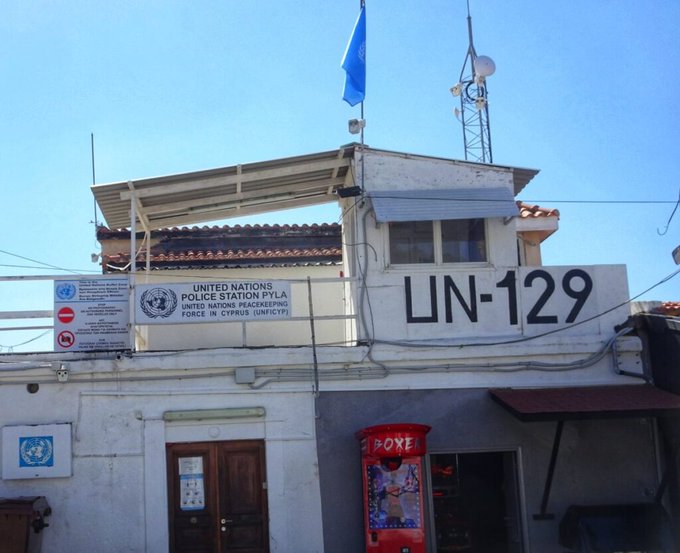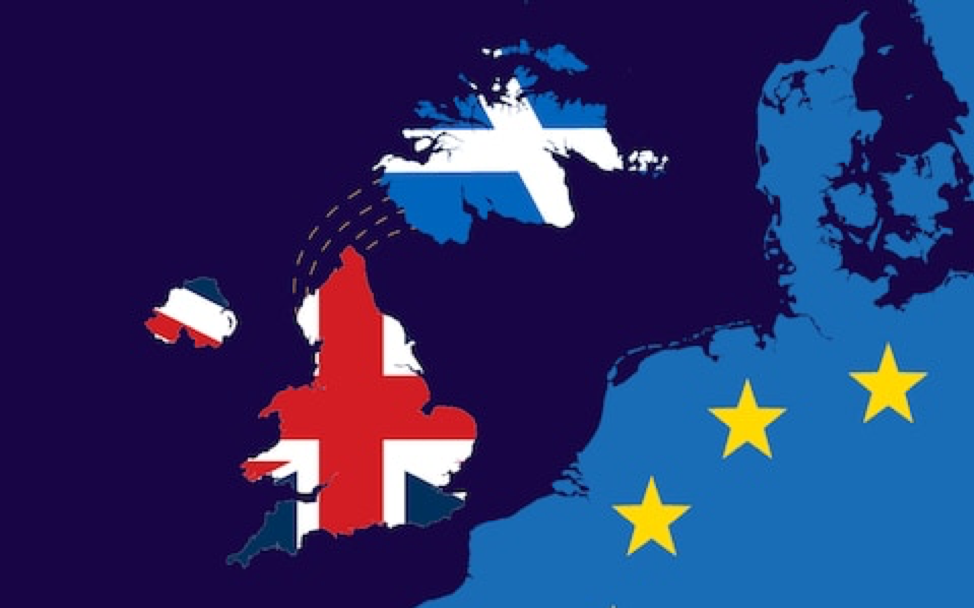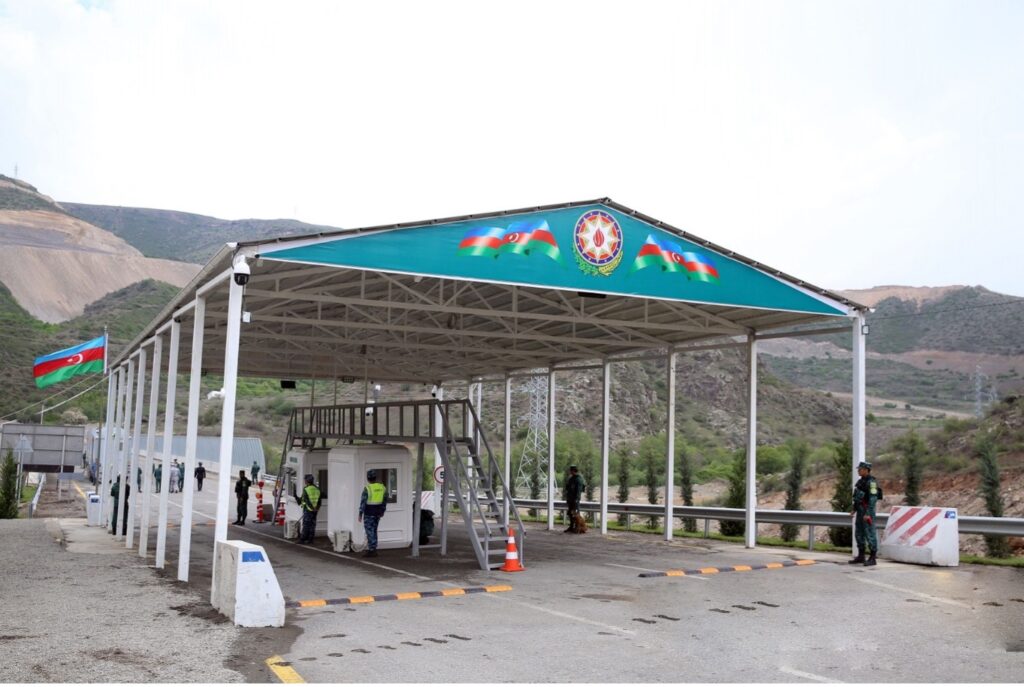It Isn’t What You Do, It’s How You Do It: The Crisis in Pyla
Situated between two hills that lean against the Mesaoria Plain, the largest plain in Cyprus, the mixed village of Pyla (Pile) takes its name from les pyles in French, meaning gates. It is as if this well-fitting name was picked on purpose, although life in the village started before the Cyprus conflict. When the UN established the Green Line (also known as the buffer zone, Dead Zone, forbidden zone) in 1963, the village, owing to its location within the UN jurisdiction, was unaffected by the violence on the island and remained mixed. In 1974 UNFICYP was able to enter the village immediately, further preserving it from serious conflict. Today, it is a gateway for a small glimpse of a united Cyprus. While some might romanticize the coexistence by claiming that it is possible through peace and siblinghood, the inhabitants of the village constantly emphasize that they simply lead their lives side by side because this is their own village and livelihood. Life in Pyla is not one of love and celebration but a careful parallel existence of both sides. A good example of such attitude can be dated back to 1963, when the Turkish Cypriot (T/C) Pileliler (those from Pyla) prevented outsider T/C militia from killing the Greek Cypriot (G/C) Pyliotes. A reverse of this incident happened in 1974, and this time it was the Pyliotes stopping the G/C militia. The motivation for the prevention of these killings by their fellow villagers stemmed mostly from one question: what will happen to us after you leave? The vague answer to this question still dominates the daily life in Pyla.
Pyla is a place of many facets. UNFICYP provides the security services of the village, and everything comes in two; two places of worship, a mosque and a church, two schools for G/C and T/C, two neighborhood representatives for the two sides and two coffeehouses located on the same village square. Electricity, water and infrastructure are provided by the Republic of Cyprus (RoC) and while G/C pay for their consumption, the T/C do not. Daily life proceeds unencumbered by the memory of past intercommunal atrocities. However, there is a power struggle over the village between T/C, G/C, and the UN since 1963. Disputed zones spread all over the village and the soil surrounding it, with people claiming this hill for the T/C, that soil for the UN, these fields for the British and those plains for the G/C. T/C distrust the UN, as they think they are biased in favor of G/C, while G/C believe that the presence of UNFICYP overshadows the authority of their own government.
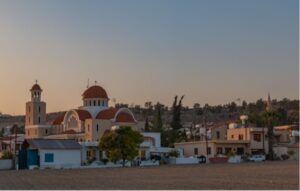
Image: The church and minaret of the mosque in Pyla (Source: terrabook)
The small village represents a place of simultaneousness for its inhabitants, harmony for G/C and problems and animosity for the T/C. The official discourses regarding the village by the North and RoC reflect these feelings. It also evokes different attitudes in the rest of the island. The G/C criticize Pyliotes for selling Turkish goods and therefore punching holes in the embargo of the North and the T/C frown upon Pileliler for the advantages they enjoy because of the job opportunities they receive in the South or Dhekelia (the British base), earning considerably larger salaries than their fellow nationals. Such sentiments have brought unjustified accusations of espionage on the kinspeople of both sides, while within the village everybody and everything seems to be constantly intersubjectively surveilled by all parties involved, plus the local and international media.
Recently on August 18, 2023, Pyla witnessed one of the largest crises of its history since 1963 and the partition of the island. Everything started when the de facto Ministry of Foreign Affairs of Northern Cyprus announced an ongoing road enlargement project between Pyla and Arsos (Yiğitler) on August 17. While the total length of the planned road equals to 11.6 kms, 7.5 kms of the road is planned within the limits of Arsos and the main issue is the 4.1 km section within the territory of Pyla. The main reason given for the initiative was that it is a humanitarian project, aimed at eliminating the British military checkpoint from the obstacles Pileliler face every day when they want to cross to the Turkish side. The crossings have been an annoyingly real problem for Pileliler since Northern Cyprus applies a visa procedure to them while Pyliotes access RoC territory with no checks at all. Not only do Pileliler have to go through a passport control at Pergamos (Beyarmudu) but they also must pass the British checkpoint, a process which takes 40-60 minutes in total considering the heavy traffic going through both checkpoints. A T/C resident of Pyla sometimes needs to cross the checkpoints multiple times a day, wasting a considerable amount their time, crippling their social and economic life, and, in their own words, threatening the continuation of their existence. The issue had been voiced by the T/C neighborhood representative to both the UN and Northern Cyprus, but bureaucracy had stalled the efforts to find a solution. A closer look at research on Pyla, dates the existence of this issue to at least since 2012 although it probably existed since passage between the two sides were allowed, rendering it a 20-year-old problem.
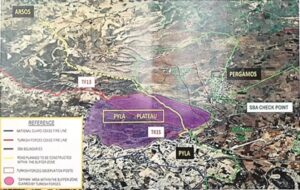
Image: Map depicting the road project and border situations in and around Pyla (Source: in-cyprus)
The UN reacted to the announcement of the project by stating that it is an unauthorized construction project and that they follow the developments with concern. On the morning of August 18, the crisis reached its boiling point when the UN announced an assault on its forces by people dressed in civilian attire accompanying the work vehicles part of the construction party working on the road. Additionally, the assailants also used construction vehicles to remove UN vehicles barricading their attempts. After the spike in tensions over the issue, the following days witnessed a back and forth between T/C, Turkey and the UN. First, the T/C police forces announced that eight of their officers were assaulted during the events. Later on, the UNFICYP spokesperson Alim Siddique stated that their forces are ready to prevent the construction. This statement was followed by the UN Secretary General Guterres, pointing out that threats against UN forces and damage to UN property are unacceptable and contrary to international law. He demanded respect for the UNFICYP mandate, withdrawal of forces and machinery from the area, and called for a constructive relationship to find a solution. Turkey responded to the UN by condemning UNFICYP for interference with road construction, blaming them for being partial and turning a blind eye to RoC actions in the buffer zone and asking for fairness.
Following these heated statements, the construction stopped and it was revealed that the company tasked with building the road was Proyap, a construction company based in Turkey which is known for its close affiliation with AK Party. After the 19 million Turkish Lira public bid in May 2023 was inconclusive Turkey gave the project to Proyap. The vehicles used to pull UN vehicles during the events were reported as belonging to the company. Furthermore, it was confirmed that the people who assaulted UN officials were Turkish police and military in civilian attire. Meanwhile, the construction works came to a halt, although the T/C Foreign Minister stated that the road would definitely be constructed. Turkish President Erdoğan leaned against the UN in a statement, blaming the UN of having ill intentions in its intervention in an era which Turkey is trying mutually with its neighbors to strengthen and smoothen their relationships. He further added to his statements by claiming that the UN is compromising the stability in Cyprus, that as a guarantor state Turkey will not tolerate fait accompli and unlawfulness, and that the struggle would continue until the equal international status of TRNC is accepted by the entire world.
It is unclear whether the connections of the perpetrators of the event with Turkey came to the attention of the UN Security Council because, ironically, they condemned not Turkey but T/C in the statement they released and urged cooperation with UNFICYP fully. This was not received well by the T/C. The Foreign Ministry of Northern Cyprus responded by calling the statement “unfortunate,” claiming that the UN tried to prevent a humanitarian project, not a military one and accusing the UN of provocative behavior. The heated exchanges took place between August 18 and 26, with the high tensions leaving their place for diplomatic discussions. Within six days, construction works had stopped, buffer zone was calm, and no personnel or vehicles were present to further exacerbate the issue.
By September 1, Politis reported that compromises were close, and were listed as follows: 1) construction of the road will continue, 2) full control of the UN in the buffer zone is emphasized, 3) creative development project is to be implemented in Pyla, 4) land between Pyla and Pergamos is to be zoned for construction, and 5) agriculture and livestock breeding zones are to be determined. The responsibility of putting these measures on paper is undertaken by Colin Stewart, the Special Representative of UNSG in Cyprus and UNFICYP Mission Chief. From the beginning of the crisis, the G/C side put only one condition forward for the construction of the road, that it would have no violation or effect on the actual state of Pyla. President Christodoulides reported on September 13 that the consultations were ongoing for a resolution, however the construction works had already begun once again on September 11. As of today, the construction still goes on but there is no formal agreement yet.
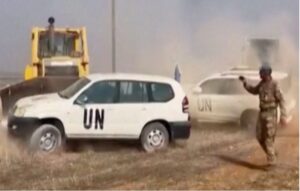
Image: Construction vehicles removing UN vehicles from their path (Source: bbc.com)
After the crisis, speculations emerged as to “who gave the order” to attack the UN officials. One of the previous Foreign Ministers of Northern Cyprus claimed that it was the Turkish military which gave the order and he had “a piece of information that requires confirmation.” He argued that because Erdoğan wants to switch tracks regarding a solution to the Cyprus Issue, and the Turkish Deep State is deeply disturbed by that the Deep State aimed to bring Erdoğan head-to-head with the UN with the “Pyla project tactics.” Another claim was that this was an event tailored to sabotage the new Foreign Minister of Turkey, Hakan Fidan. Before the events, there were rumors of the Turkish FM possibly receiving an invitation for the Gymnich meeting for the first time in five years (he was not invited to the meeting on August 31). Pyla crisis meant that as soon as he arrived at his seat, he chaired the most serious crisis of Turkey and Northern Cyprus with the UN and the international community in many years. It is extremely difficult to find proof for both of these claims and furthermore, I believe that these claims are the result of the evasion to address the elephant in the room.
The events in Pyla are a result of the mahalle kabadayısı (neighborhood bully) attitude which has dominated Erdoğan’s discourses and Turkey’s foreign policy in the past years. Widespread corruption and political patronage are also the main culprits as far as I am concerned. Proyap probably was not at all equipped to deal with a possible diplomatic crisis. This is evident from the non-existence of qualified diplomatic representatives during the construction works but the presence of military and police. Furthermore, because the public bids in Turkey are not distributed by merit but by proximity to the governing party, there probably was no intention at all to handle anything in a diplomatic fashion. The mindset of “we have full power, and we will do anything to showcase it to reach our goals” dominated this crisis, supported by the actions and words of Erdoğan and Turkey. Interestingly, the statement by the UNSC never gained attention in the Turkish mainstream media, and the halted construction efforts were never covered.
Throughout the crisis, Pileliler constantly emphasized that the road is a necessity, but they never meant for any of these worrying developments to occur. The guilt they feel for all the events that transpired is prevalent in the interviews made with them. Although the guilty parties are different, the feelings of guilt stem from the same mindset of the precarious parallel existence they find themselves in. The outsiders came to their village, acted in a way that could possibly harm their daily life and risked everything. Although the humanitarian request for a road by Pileliler in any sense is a reasonable and just one, the actions of outsiders who do not understand the local dynamics, but only aim to push their political and economic agenda forward led to the condemnation of T/C by the UNSC and feelings of shame, guilt and fear within Pileliler. Luckily, the question “what will happen to us after you leave” is a mutual question asked both by Pyliotes and Pileliler, creating a mutual understanding and preventing the crisis from spreading to the relationship between the inhabitants of the village.
Author: İzzet Yalın Yüksel


